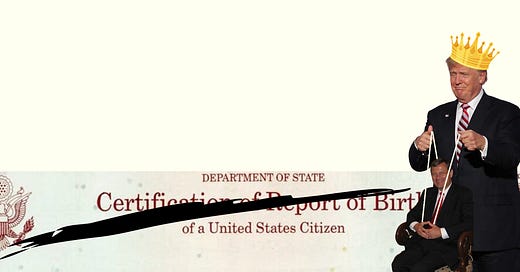Subscribe to Court Accountability’s newsletter, Tilted Scales, here.
For information on key issues moving through the courts, see Court Accountability’s judicial threat tracker and Supreme Court June decisions preview.
What Happened?
Today, the six Republican-appointed justices on the Roberts Court cleared the way for President Trump to deny birthright citizenship to babies born in the United States to foreign-born parents. Rather than ruling on the constitutionality of birthright citizenship—which is very clearly granted under the Fourteenth Amendment—the right-wing justices simply removed the impediment to Trump’s unlawful actions by prohibiting lower courts from issuing nationwide injunctions to protect all Americans.
The decision removes access to justice for countless people across the country—and not just for those whose citizenship is now in question because of the Trump order. This ruling means that lower courts cannot issue nationwide injunctions to protect Americans from any unlawful abuse of power by the executive branch. In effect, the Supreme Court has gutted the power of any other federal court to serve as a check on presidential power.
What’s the Broader Context?
The Constitution could not be more clear on birthright citizenship, which is enshrined in the Fourteenth Amendment: “All persons born or naturalized in the United States, and subject to the jurisdiction thereof, are citizens of the United States and of the State wherein they reside. No State shall make or enforce any law which shall abridge the privileges or immunities of citizens of the United States.”
Trump’s DOJ knew it had no chance to win this case on the merits, so instead it pushed ahead with a legal argument designed to keep this unconstitutional policy alive as long as possible. And Justice Amy Coney Barrett, writing for the Roberts Court’s Republican majority, adopted that argument in an opinion that callously perpetuates Trump’s anti-constitutional cruelty while sowing more confusion, chaos, and uncertainty for the public.
Confusion: The majority opinion effectively says universal injunctions are likely illegal—effectively banning their use—but does not clarify how district courts can afford the plaintiffs before them “complete relief.” Do district courts’ judgments apply throughout their entire jurisdiction, as typically understood, or only to the parties before them? Justice Barrett refused to answer: “We decline to take up these arguments in the first instance. The lower courts should determine whether a narrower injunction is appropriate; we therefore leave it to them to consider these and any related arguments.” In other words, the Roberts Court has told district courts they cannot issue nationwide injunctions—but has not made clear how much “narrower” their injunctions must be. This leaves families affected by Trump’s predatory executive order in the dark: will their children’s rights depend on which state they live in? Does each family need to sue individually for their children’s rights to be protected? These families will not get the answers they need until the issue moves up through the lower courts—again.
Chaos: Justice Sonia Sotomayor noted in her dissent that the majority’s decision “would require creating a two-tiered scheme in which the Government’s recognition of some children’s citizenship status or eligibility for federally funded benefits would change based on whether a child resides in one of respondent States at any given moment…discarding the nationwide status quo of birthright citizenship would result in chaos.”
Uncertainty: The majority says babies and their representatives—organizations, states—can file a class action lawsuit to get nationwide relief now that universal injunctions are effectively banned. But the Roberts Court has also long been antagonistic to class actions and has recently grown skeptical of organizations’ and states’ standing to sue as third parties. Justice Samuel Alito used his concurrence, joined by Justice Clarence Thomas, to make explicit the majority’s potential bait-and-switch: “Lax enforcement of the requirements for third-party standing and class certification would create a potentially significant loophole to today’s decision. Federal courts should thus be vigilant against such potential abuses of these tools.”
Put it all together and, as Justice Jackson concluded, “[t]he Court’s decision to permit the Executive to violate the Constitution with respect to anyone who has not yet sued is an existential threat to the rule of law.” This is an exceptionally strong warning from inside the Court itself that the Roberts Court is not a guardrail for the rule of law, but a direct threat to it.
What Can You Do?
Stand up and speak out. On July 17, join communities around the country for a “Good Trouble Lives On” march to respond to the attacks on our civil and human rights and remind the Trump administration that in America, the power lies with the people. Find an event near you here.
Contact your members of Congress and let them know that you expect them to fight to protect the people’s power. Ask them how they plan to use their constitutional power to protect Americans’ rights and freedoms against Trump’s and the Roberts Court’s authoritarian attacks.
Call on your representatives and senators to support the Born in the USA Act, which would prohibit the use of funds to carry out Trump’s unconstitutional executive order against birthright citizenship.
Call on Congress to pursue court reforms to rein in the abuse of judicial power.
Find your representative’s contact information here.
Find your senator’s contact information here.
Share resources and calls to action on immigrants’ rights and birthright citizenship from the ACLU, Stop AAPI Hate, United We Dream, the Immigrant Legal Resource Center, Immigration Advocates Network, the National Immigration Law Center, and others.





